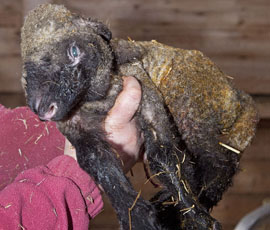Schmallenberg could force farmers out of business

Sheep farmers could be forced out of business if they suffer heavy losses during the lambing season due to the Schmallenberg virus, scientists have warned.
Cases of the virus in Belgium have seen some farmers suffer losses of about 25% and a similar impact here could be detrimental to the fortunes of struggling sheep farmers, warned Peter Mertens of the Institute for Animal Health (IAH).
“Sheep farmers have had a tough time in recent years with bluetongue and foot-and-mouth and the Schmallenberg virus might push some farmers out of business,” said Prof Mertens, head of the Surrey institute’s vector-borne viral diseases programme.
“If losses are as bad as 25%, that will be the end of this year’s profits – and maybe more.”
Although the AHVLA had officially confirmed only 11 cases of the Schmallenberg virus in the UK by 31 January, the true extent of the disease is still unknown, he added.
“We’re still at the beginning of the lambing season and we have not really got an idea about what it (Schmallenberg virus) is going to do in cattle at the moment,” said Prof Mertens.
“It’s an unknown at the moment, but what we do know is that it can cause congenital defects, particularly in lambs.”
The Schmallenberg virus was first identified in Germany last autumn and scientists believe it was carried to the UK by Culicoides (biting midges).
Work is expected to begin shortly at the institute in Pirbright to identify the source of the infection.
Samples of the virus have been sent from Germany to the institute, which will be used on colonies of midges and mosquitoes.
“We will test them to see firstly whether you can infect the insects, and secondly, if the insects can infect others,” explained Prof Mertens.
On Wednesday (8 February), leaders from the IAH are due to meet with their counterparts at the AHVLA to discuss the most effective ways of using test systems for the Schmallenberg virus.
The plan is for scientists at the IAH to carry out the research work into the virus, while the Animal Health and Veterniary Laboratories Agency (AHVLA) takes charge of the diagnostic work.
The absence of a serological test means some farmers are being asked to wait more than a week before they can receive test results, which has caused frustration and anxiety.
Prof Mertens said he and his team were working with their counterparts at the Friedrich Loeffler Institute in Germany and Maisons Alfort in Paris to try and get an enzyme-linked immunosorbent assay (ELISA) in place “to screen more cases and tell farmers more quickly”.
The Schmallenberg virus is not a notifiable disease and therefore farmers do not have a legal duty to notify the authorities of suspected cases.
However, Prof Mertens said it was “vitally important” that farmers remained vigilant to the symptoms of the disease and informed their vets immediately about any suspected cases.
“If we want to build a picture about the extent of the virus and to alleviate the problem, then it’s vital that all suspected cases are reported,” he added.
Share your own thoughts on Schmallenberg on the forums and follow the latest developments on our dedicated page.
